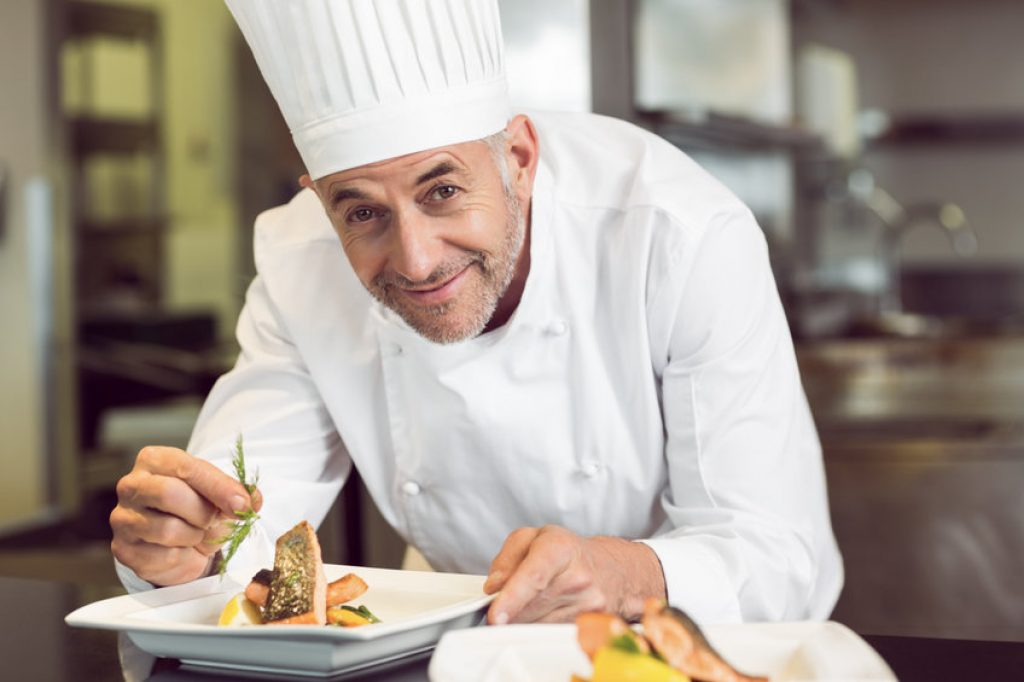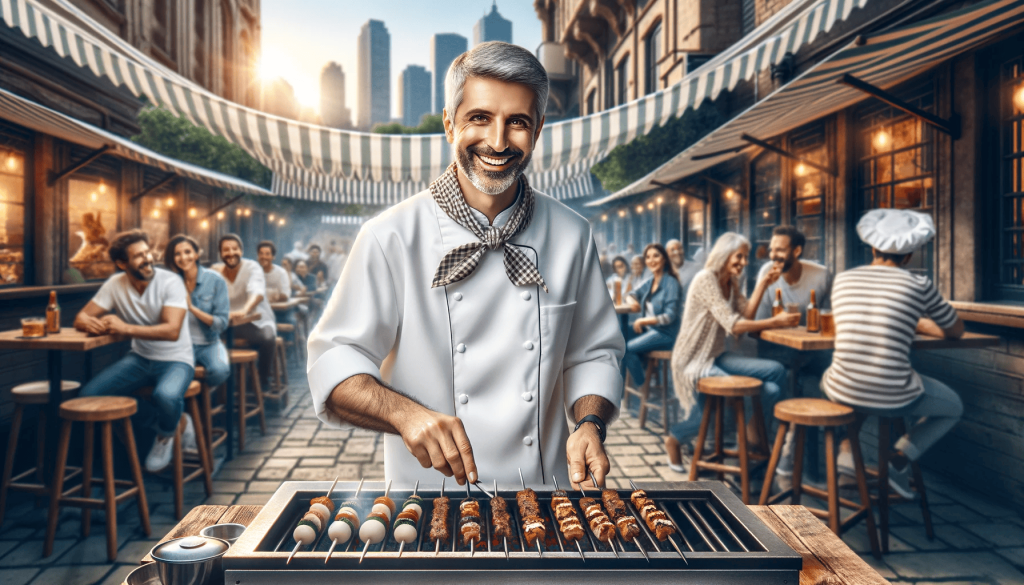Personal Chef Insurance – Cost and Types of Policies
We are introducing the subject of Personal Chef insurance now because there has been a significant growth in the demand for personal and private food preparation services.
Need
Personal Chef Insurance ?
Get Your Free Quote
Many start-up operations should look carefully at what insurance they need as they get going in this unique sector.

What is The Difference Between a Personal Chef and a Private Chef?
There is quite a fundamental difference between these two occupations.
So that you can understand what the differences mean to you when considering what insurance you need, we will attempt to define the terms first before we talk directly about the insurance needs.
The most basic difference is that a private chef is employed by just one party—usually, one family residing in a home or a company operating a dining room for senior executives and guests.
The chef does meal planning, and buys or supervises the buying of all ingredients, utensils and kitchen & dining facilities.
They cook or manage other kitchen staff doing the cooking full-time. Usually, this involves all meals daily. Basically, all home or executive suite activities that deal with food and drink are their responsibility.
Small Business General Liability Protection:
Get Your Free Quote
Private chefs can be household staff members, usually on the payroll.
If it’s a domestic position, when the household moves around, it’s not unusual for them to take the chef and kitchen staff along with them cooking every meal, every day.
They may even live on the premises.
Employees in any sector or industry are protected against being personally sued by a third party.
The employer has to provide insurance and, in any case, bears the liability in case of accidents, injuries or any other sort of claim.
Basically, unless a private chef is working under exceptional conditions, and is legally excluded from the standard protection that is given to employees, there is no need for them to take out their own insurance.
It’s good practice to clarify in any conversation before joining up as a private chef that there are no such special conditions or clauses.
Get Your Business Insurance:
Get Your Free Quote
A personal chef prepares meals for customers and clients, either in their kitchens or from her own commercial kitchen.
The workflow comes from orders from individuals and companies wanting to offer food and drink on specific dates to a specified number of people.
Operating as a personal chef means that you are running a business operation.
That means that the same risks apply to you as they do to any business.
You need to take out insurance that covers all those risks to protect yourself.
Here’s a table outlining the differences between a Personal Chef and a Private Chef:
Get Your Business Insurance:
Get Your Free Quote
| Aspect | Personal Chef | Private Chef |
|---|---|---|
| Employment | Operates as a business, serving multiple clients or companies. | Employed by a single party, usually one family or company. |
| Responsibilities | Prepares meals for various customers, either in their or own commercial kitchen. | Manages all food-related activities in the home or executive suite, including meal planning, purchasing ingredients, and cooking. |
| Work Environment | May work in different kitchens based on client needs. | Often works in a single household or company dining facility. |
| Mobility | Travels to clients’ locations as required. | May travel with the employer, especially in domestic settings. |
| Living Arrangements | Does not typically live on the premises of the clients. | May live on the premises, especially in domestic settings. |
| Insurance Needs | Personal Chef Insurance requires own business insurance to cover risks associated with operations. | Private Chef Insurance is usually covered by the employer’s insurance, with less need for personal insurance. |
This table highlights the primary differences in employment, responsibilities, work environment, mobility, living arrangements, and insurance needs between personal and private chefs.
In What Way Do Personal Chefs Need Unique Insurance Coverage?
There are two main classes of risks in any commercial operation.
The first one is liability and the second one is the protection of assets.
Personal Chef Liability Insurance
General liability Insurance
When you are operating a business, you have a “duty of care” that you will keep your work area safe.
If a person is injured or their property is damaged while they are in your workplace they can claim that you did not fulfill the duty of care, and can sue for damages.
Usually, the insurance policy that you need to protect you is called General Liability insurance, but it also goes by the nickname “trips and falls” insurance.
This is because the most frequent kinds of claims come when someone visiting your workplace trips over a loose carpet or broken step, and they fall and injure themselves, tear some part of their clothing and other such damages.
The insurance protects your business from paying for such third-party bodily injury and property damage claims.
Product Liability Insurance
Because your business is supplying some products (in your case – food and drink), you are also liable for the consequences if the product in some way causes some personal injury or illness to the consumers.
To protect yourself, you must have Product Liability insurance.
The risks you should be protected from are the contraction of illness caused by food preparation with polluted or infectious ingredients or improper cooking methods.
Professional Liability Insurance
As well as these liabilities, you have to provide your services and products in a professional and industry-standard way, and in case of anything going wrong, you should have Professional Liability (also called Errors & Omissions or E&O) insurance cover.
An example of where E&O cover would be needed is where you were given specific requirements to avoid some foods because of known allergies for some people attending a meal, but by accident some ingredient you purchased for the cooking contains the trigger of the allergies.
The resulting lawsuit against you as the person responsible could have a final settlement judgment of millions of dollars if the reaction is severe enough to be life-threatening.
In all of the insurance policies covering liability, a significant benefit is that the insurance company has to defend against any lawsuit, even if you were at fault.
This means that you do not have to find your own lawyers and run the risk of having to pay their fees and any settlement awarded by a court, which can also include the legal costs of the other party.
Asset Insurance For Personal Chefs
Any buildings where you are working, whether they are owned by you, or are used on a long-term or temporary lease, must be protected against natural damages like fire, storms, earthquakes and floods, and also from deliberate damages like vandalism and sabotage.
To cover these risks, you should have Commercial property insurance.
Car Insurance For Personal Chefs
Suppose you use cars, trucks or vans in your work, for transporting food and workers between your premises and customer sites.
In that case, you need Commercial Auto insurance because your private auto insurance does not cover the risks from using a personal car for work purposes.
This cover gives much higher limits for claims than private insurance, usually between $500,000 to $1 million in case of a major claim.
Equipment Insurance For Personal Chefs
You probably have a lot of money invested in all the special utensils, cooking gear and appliances that modern professional chefs need to satisfy their customers’ demands.
You can’t afford to have all of this at risk from damage, loss or theft.
So a proper Equipment Insurance policy will give you the safety of knowing that if any of these happen, then you can go out and replace the missing stuff and get a refund from your insurance provider.
Business Interruption Insurance
A business interruption insurance policy is available for chefs operating as a sole proprietorship and provides coverage for income lost due to closure for reasons of personal injury or sickness.
It covers the period of closure until the time your business is running again.
If you are running a single-person operation, it makes sense to protect your personal income if something happens that stops you from working normally.
Can insurance coverage be combined into one policy?
Some companies offer a single policy covering general liability, commercial property and equipment in a single Business Owners Policy (BOP).
The main benefits for you will be cheaper premiums and simpler administration, with all the renewals taken care of in a single step.
How much insurance does a personal chef need, and what should it cost?
Every business is unique, so we can’t tell you exactly what levels of cover are proper for your specific operations.
It’s good to get advice from local insurance agents and brokers.
Another way of getting good information is to search the subject on Google or any other browser service.
Based on our own knowledge about other service providers who face similar liability risk levels to you, such as Nightclubs, Event Planners, and Music Venues, we can suggest that you should be looking at the following general levels for roughly the costs we are showing for annual premiums:
| Insurance type | Basic level of cover | Expected range of annual premium |
| Professional Liability (Errors & Omissions) | $1 million full year
$250,000 single claim with $1000 deductible |
$1200 – $1500 |
| General Liability | $2 million full year
$1 million for a single claim |
$400 – $700 |
| Product liability insurance | $1 million for the full year
$250,000 single claim |
$1200 – $2000 |
| Commercial auto insurance | Based on replacement cost | $1350 – $2300 |
| Commercial property insurance | Calculated on insurable value (IV) | $0.35 – $0.50 per $100 IV |
| Business interruption | $10,000 with $500 deductible | $200 – $350 |
| BOP insurance | $2 million general liability + calculated commercial property cover | $350 – $500 & $0.30 – $0.45 per $100 IV |

FAQ
Does having good insurance improve your chance of getting business?
Apart from the protection that good insurance provides your business, it can also be used as a marketing tool to get you more business.
Today, customers have become increasingly aware of the possibility of suing a service provider for a wide range of claims.
When you can show your potential customers that your business is adequately insured against the three liabilities (general, product and personal liability), then the customer will get a better impression that you are running a proper and professional operation.
They will also know that if a claim does arise, they will be properly rewarded and not be left holding a worthless judgment against a business that simply does not have enough money to pay.
Being able to show a certificate of insurance (COI) will bring you more customers.
Can you save on insurance premiums by agreeing to accept some of the risk?
You can make your premiums lower by negotiation for deductibles that you pay first, out of each claim.
Insurance companies don’t want to be hassled with small claims.
They cost them more to process, in time and effort, than the total of the claim.
By agreeing to pay the first few dollars on any claim, you will be able to get better premiums because most claims don’t reach the level of the deductible.
What insurance policies are essential for a chef running a pop-up restaurant?
 For a pop-up restaurant, a chef should consider several types of insurance to ensure they are fully protected.
For a pop-up restaurant, a chef should consider several types of insurance to ensure they are fully protected.
The primary one is General Liability Insurance, which covers incidents like customer injuries or property damage.
Product Liability Insurance is also crucial, as it protects against illnesses caused by the food served. Since pop-up restaurants are temporary and often set up in unique locations, Property Insurance should be tailored to cover equipment, inventory, and any rented space.
If the chef employs staff, Workers’ Compensation Insurance is necessary to cover employee injuries on the job.
Additionally, Business Interruption Insurance can safeguard against unexpected events that disrupt operations, and if alcohol is served, Liquor Liability Insurance is essential to protect against the risks associated with alcohol service.
It’s also wise to consider policies that cover issues unique to pop-ups, such as cancellation or postponement and transportation of supplies and equipment. Consulting with an insurance agent who understands the nuances of the pop-up dining scene is the best way to ensure all potential risks are covered.

